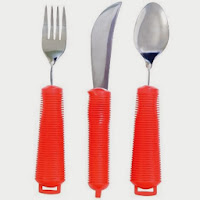
PRODUCT OF THE WEEK:
60% of people with Alzheimer’s lose visual capacity and 40% lose weight. A Boston University Alzheimer’s study showed bright red tableware increased food intake by 24%. Check out these bright red utensils with large easy-grip handles, a bendable fork & spoon, plus a knife with a rocker blade for easier cutting.










